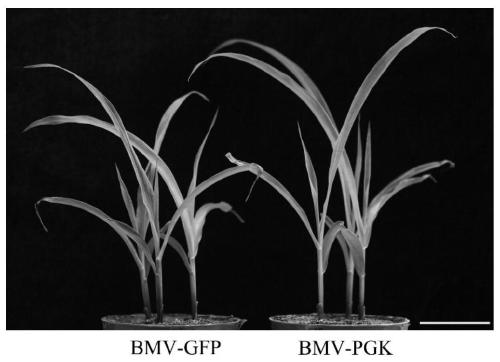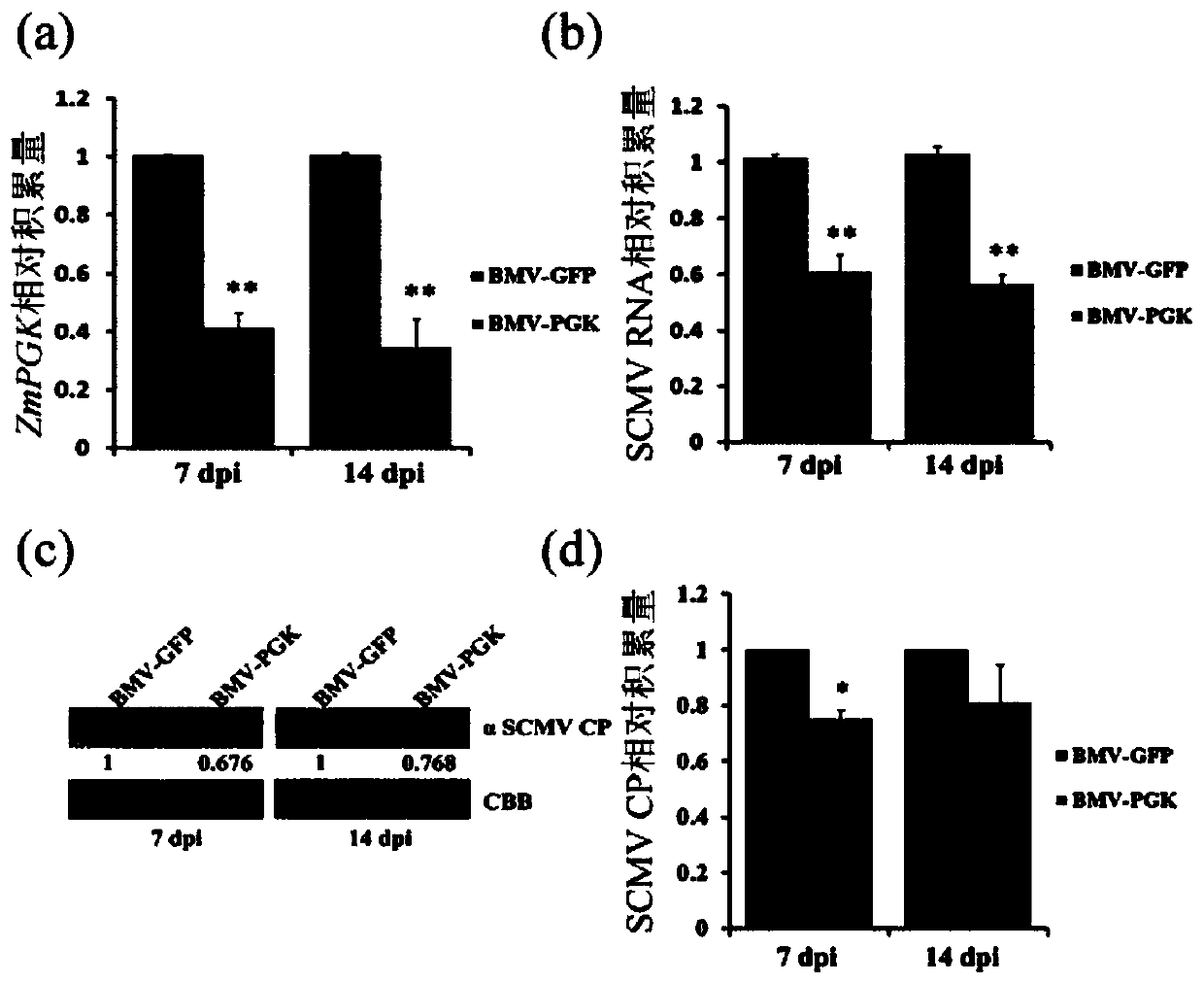Application of zmpgk gene in the control of maize dwarf mosaic disease
A technology of sugarcane mosaic virus and corn, applied in application, genetic engineering, angiosperms/flowering plants, etc., can solve problems such as loss of resistance to viruses, production hazards, etc., and achieve the goal of improving research levels, promoting and ensuring production safety Effect
- Summary
- Abstract
- Description
- Claims
- Application Information
AI Technical Summary
Problems solved by technology
Method used
Image
Examples
Embodiment 1
[0053] Example 1 Discovery of ZmPGK protein and its coding gene
[0054] Using isobaric tagging for relative and absolute quantification (iTRAQ) proteomics technology and method, the proteins that were significantly differentially expressed in the upper first and second systematically infected leaves after SCMV infection were screened, and identified A protein ZmPGK that is significantly differentially expressed in the two leaves is found, the sequence of which is shown in SEQ ID NO:1. The gene encoding the ZmPGK protein is named ZmPGK gene, and its sequence is shown in SEQ ID NO:2.
Embodiment 2
[0055] Example 2 Construction of recombinant plasmid pC13 / F3-13m-PGK
[0056] 1. Extract the total RNA of maize inbred line Va35 and reverse transcribe it into cDNA.
[0057] 2. Using the cDNA obtained in step 1 as a template, perform PCR amplification with a primer pair composed of ZmPGK-silencing-F and ZmPGK-silencing-R to obtain a PCR amplification product.
[0058] ZmPGK-silencing-F: 5'-GA CCTAGG TCTCTTATTGAGAAGGC-3'
[0059] ZmPGK-silencing-R: 5'-TC CCATGG GGCCGTTCCAAAT-3'
[0060] 3. Digest the PCR amplified product in step 2 with restriction endonucleases Nco I and Avr II, and recover the digested product.
[0061] 4. Digest the vector pC13 / F3-13m with restriction endonucleases Nco I and Avr II, and recover about 5000 bp of the vector backbone.
[0062] 5. Ligate the digested product of step 3 with the vector backbone of step 4 to obtain the recombinant vector pC13 / F3-13m-PGK. According to the sequencing results, the structure of the recombinant vector pC13 / F3-13...
Embodiment 3
[0064] Example 3 Transient silencing experiment of ZmPGK gene
[0065] 1. Expansion of BMV virus particles in Nicotiana benthamiana
[0066] 1. Infiltrating Nicotiana benthamiana with Agrobacterium carrying BMV vector
[0067] (1) Transform the correctly sequenced pC13 / F3-13m-PGK vector into Agrobacterium C58C1 competent cells; at the same time, the Agrobacterium carrying pC13 / F1+2 and pC13 / F3-13m-GFP stored at -80°C Streak on LB plates (containing 50 μg / ml Kan, 100 μg / ml Rif), and culture at 28°C for about 48 hours. Pick a single colony on the LB plate and inoculate it in 3-4 ml of LB liquid medium (containing 50 μg / ml Kan, 100 μg / ml Rif), culture at 28°C, 180 rpm for 14-18 hours;
[0068] (2) Transfer 200-300 μl of the bacterial solution to 20-30 ml LB liquid medium (containing 50 μg / ml Kan, 100 μg / ml Rif) at a ratio of 1:100, and incubate at 28°C and 180 rpm for 10-12 hours;
[0069] (3) Room temperature, 4500rpm centrifuge 8min to collect the bacteria, use 20ml infiltra...
PUM
 Login to View More
Login to View More Abstract
Description
Claims
Application Information
 Login to View More
Login to View More - R&D
- Intellectual Property
- Life Sciences
- Materials
- Tech Scout
- Unparalleled Data Quality
- Higher Quality Content
- 60% Fewer Hallucinations
Browse by: Latest US Patents, China's latest patents, Technical Efficacy Thesaurus, Application Domain, Technology Topic, Popular Technical Reports.
© 2025 PatSnap. All rights reserved.Legal|Privacy policy|Modern Slavery Act Transparency Statement|Sitemap|About US| Contact US: help@patsnap.com


